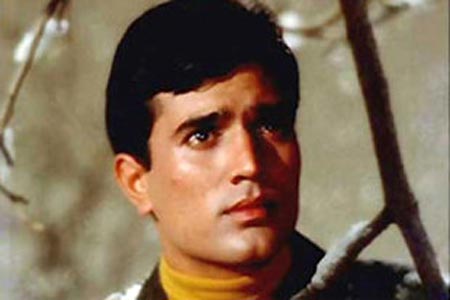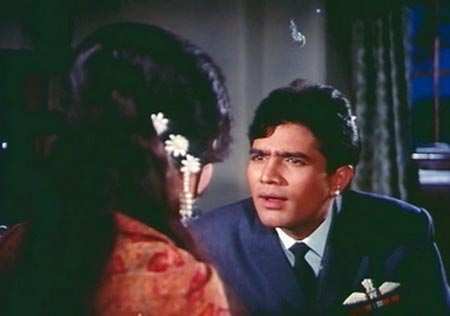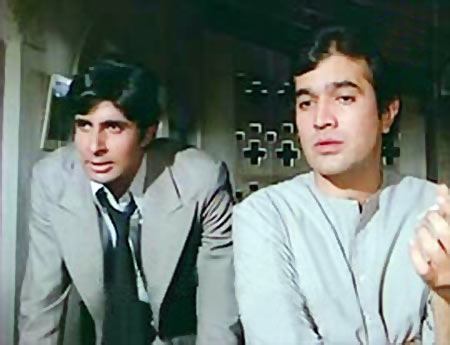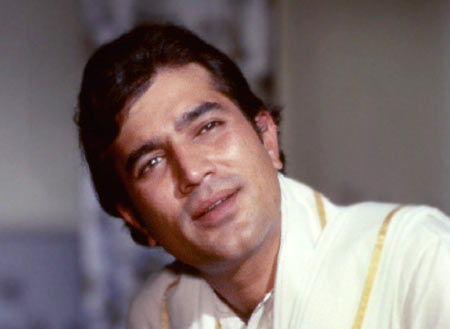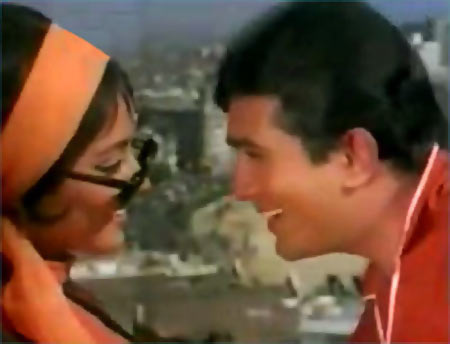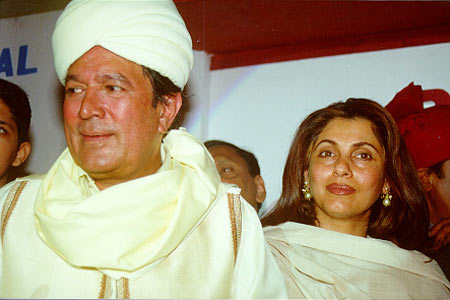This article was first published 13 years ago
Home »
Movies » The Reasons That Led Rajesh Khanna To His Downfall
The Reasons That Led Rajesh Khanna To His Downfall
Last updated on: July 2, 2012 12:10 IST
Image: Rajesh Khanna
At his peak, Rajesh Khanna was a phenomenon unlike anything Indian cinema had seen. Malavika Sangghvi writes on the man, the mystique and the hubris that led to his downfall.
Each generation has its folk tales and mythology, its stories of Gods and Goddesses, kings and generals, saints and sinners -- larger-than-life beings whose lives serve as morality tales for lesser creatures, whose examples teach us how to live life, how to survive its successes and failures and how to bear its monumental vicissitudes and challenges.
Could there be a morality tale more significant than Rajesh Khanna's?
Khanna came out of the blue, a virtual outsider to the world of films. In half a decade he tasted such spectacular success that a new lexicon had to be adopted to describe him: superstar, the phenomenon, megastar, to name a few. And every cliche of fan worship attached itself to him: screaming women, lipstick- adorned cars, sick kids brought by mothers to heal, and so on.
And then, as spectacular as the rise, came the fall.
After 14 consecutive box office hits, seven clanging flops were as mortifying as they were mystifying.
And then came the silence, the withdrawal of attention and adulation, memories and regrets.
Image: Rajesh Khanna in Aradhana
I never thought it would end," Khanna once said to Rauf Ahmed, the editor of the film monthly Super.
"I had no reference points on how to handle such success. No one had experienced it."
Khanna, Rauf tells me, "made many mistakes. He rode roughshod over many people, alienated many like Yash Chopra who he'd once been close to. Meanwhile, Amitabh [Bachchan], with brother Bunty [Ajitabh] by his side, had consolidated his position in the industry, and formed a clique of producers and directors like Prakash Mehra and Manmohan Desai who gave him solid hits."
The Bachchan wave of the 1970s killed Khanna's superstardom.
Javed Akhtar, the man credited, along with his scriptwriting partner Salim Khan, with creating the angry young man persona for Bachchan, which is supposed to have turned the tide against the Khanna phenomena, speaks to me from America: "Khanna witnessed unbelievable popularity, such that no one had ever seen or imagined. In fact from 1969 to 1973, it was a one-horse race. It would be said of those days that before any Indian child could say mama and papa, he would say Rajesh Khanna."
Akhtar says that Salim and he captured the angst and anger of the era with films like Sholay and Zanjeer, but it wasn't a well thought-through strategy to bring down Khanna. "We didn't think about it when we did it; perhaps because we were of the same generation we just reflected it. Until then Khanna's was an unprecedented run of success."
Image: Rajesh Khanna and Amitabh Bachchan Namak Haram
And what a run it was: screaming girls, swooning fans, blood-soaked marriage proposals, a furore wherever you went.
"Today words like superstar and icon are loosely used. But he truly was a megastar. And before he got lost in a whirl of his own caricature, he knew his acting chops," says Jitesh Pillai, the editor of Filmfare, the magazine responsible for introducing Khanna, a middle class boy from Thakurdwar in Mumbai, to films in 1965.
"The king of romance, he was quite the Casanova. Girls wrote to him in blood and he made no bones about being king of the screen and tabloids -- he had the shortest but most mammoth spell as a superstar," Pillai adds.
Khanna was dating my cousin Anju Mahendru who'd brought him over a couple of times to our home in Juhu. Khanna was my generation's phenomenon but we were diehard Shashi Kapoor fans. It was that kind of time: you had to like Elvis Presley or Cliff Richard, the Beatles or the Stones. So we were determined not to be impressed with Khanna and paid him no heed. He was just one more actor in the crowd for us, our cow eyes trained on Shashi.
I went to school in Bandra, a stone's throw from his bungalow, Ashirwad. Every day, we feigned mock horror when girls would sneak away to stand outside his balcony to catch a glimpse of him. That one of my classmates was called Dimple Kapadia and had been signed recently by Raj Kapoor to do a film was only one more way that defined the ubiquity of Khanna in our lives. He was omnipotent, universal and unavoidable.
Image: Rajesh Khanna in Amar Prem
Yet, he began life in Bollywood as an outsider, a pretender of sorts.
It might be interesting, especially for people outside Mumbai, to understand the milieu of Thakurdwar, a middle-class Maharashtrian neighbourhood in central Mumbai, and the school that Khanna attended. Thakurdwar is a warren of sturdy old buildings and shops built in the 1930s. There is a quotidian and downbeat but solid feel to the place.
Temples and teashops, kids going to school and grandparents tending the tulsi plant in the balcony. No Impala cars, no Vat 69 bottles and no stuffed dead animals in the porches here. The world of films resided far away across the train lines in Juhu and Vile Parle.
Khanna was brought here by his adoptive parents, and he attended the St Sebastian Goan School in Girgaum, the kind that well-meaning pastors of the Church ran all over the city: the "Our Fathers" and march-pasts, dusty playing fields and moral science kind of schools.
Modest and middle class his background might have been, but like the rest of Mumbai in the 1950s he was secular, urbane and gentrified. Here Khanna learnt theatre, Shakespeare and the English he was to speak for the rest of his life, which never completely abandoned his Amritsari roots.
And then came KC College, a south Mumbai commerce institution, meeting and wooing the dusky, sophisticated model, Anju, and the studio rounds.
Image: Rajesh Khanna in Andaz
Khanna entered filmdom at the right moment, says Ahmed.
In 1965, the popularity of the trinity of Dev Anand, Raj Kapoor and Dilip Kumar was on the decline. Shammi Kapoor was big but had started to repeat himself.
"The audience was looking for a change and along came Khanna and brought in his own freshness, which was an amalgamation of the trio plus a bit of Shammi. In Andaz, Shammi and Khanna came together, and the contrast was noticeable. Khanna's freshness was appreciated."
From there, it was a quick climb to the top -- professionally, financially and socially. It was heady success that could have bred arrogance in the saintliest of saints.
Devyani Chaubal a phenomena of that era, a journalist with Eve's Weekly and Star & Style, the twin delights of those times, knew Khanna from those days. She'd attained a kind of notoriety for being his self-styled lover, confidante and promoter. A whimsical, complicated and moody lady whose columns held the city in thrall, I recall meeting her in the late 1970s when she was alone and dying in a tiny nursing home on Linking Road, her glory days far behind her.
All she wanted to do was talk about Khanna: the man, his moods, the agony and the ecstasy. Nothing else appeared to matter to her, neither her own career nor her dwindling health. It seemed a lesson in love and longing. "Above all," she whispered in her wavering voice, "I adored his arrogance. He didn't give a damn about anybody."
Image: Rajesh Khanna in Anand
This arrogance translated on to the screen too. "Right from the early start in Iteffaq or Khamoshi, he had it in spades. You could see the insouciance of his personality in Anand or Hrishikesh Mukherjee's solid adaptation of Beckett in Namak Haram," recalls Pillai.
Zeenat Aman, one of the many leading ladies who worked with Khanna, remembers how he had become a prisoner of his larger-than-life persona. "Once, after a long overseas shoot on a Shakti Samanta film, we were all jetlagged when we returned to Mumbai but were required to go for a relief drive for nation building. And I was struck by the generosity of the contribution he made. It was really a very substantial amount."
After his glory days, Khanna withdrew into the environs of his famous bungalow and only the rumours of his erratic and whimsical behaviour emerged. His personal life appeared to be shambolic after his estrangement with Dimple and a few failed relationships. His drinking was said to have got out of hand. The rumours grew bizarre, his eccentricities and indulgences were the subject of speculation, and his attempts at resurrecting his career and entering politics seemed pathetic and confused.
Image: Dimple Kapadia and Rajesh Khanna
Around this time, in the 1990s, for some inexplicable reason, a journalist began receiving late-night calls from Khanna. In his fruity bubbling voice, the ageing ex-superstar would try and woo her. Reading out her columns in his unmistakeable voice, talking about his life, requesting meetings for tea and dinner, he appeared full of enthusiasm and beans.
And then, as inexplicably, the calls stopped. "I never knew why he began calling me up or how he got my number," she says. "It was as inexplicable as the rest of Khanna."
Recently, when news came that he was in and out of hospital, Dimple was by his side. I manage to speak to her; it is not an easy conversation. From the time we had been in school together a great deal had happened. And Dimple's life has been one of heart-wrenching tragedy. What could one say to such a woman? I try to keep my questions neutral as I am aware of the undertow of so much unspoken sadness.
I ask her what made Khanna so special to people. "I don't know" she says. "I guess he's just blessed. I can't put a finger on it but he has this tremendous power to draw people to himself. It's not a calculated thing. He's just blessed."
Is that what drew her to him? "I was a young girl of 15 when I met him," she says, "It was his stardom, his romantic hero image and infatuation. Every woman was in love with him. I just happened to be one of them." And how is he? "He's doing better, he's just a bit weak; we'll be here [in hospital] for a few more days," she says.
For her sake, his sake, and that of his countless fans, I wish him well.
Source:

